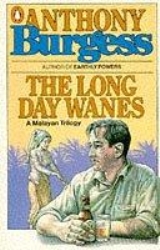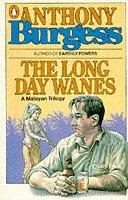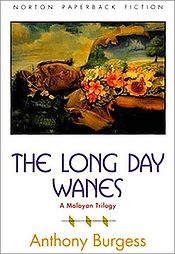
The Long Day Wanes
Encyclopedia



Anthony Burgess
John Burgess Wilson – who published under the pen name Anthony Burgess – was an English author, poet, playwright, composer, linguist, translator and critic. The dystopian satire A Clockwork Orange is Burgess's most famous novel, though he dismissed it as one of his lesser works...
's novel cycle about the withdrawal from empire.
It is a detailed fictional exploration of the effects of the Malayan Emergency
Malayan Emergency
The Malayan Emergency was a guerrilla war fought between Commonwealth armed forces and the Malayan National Liberation Army , the military arm of the Malayan Communist Party, from 1948 to 1960....
and of Britain's final pull-out from its Southeast Asian territories. The title refers to the Victorian era
Victorian era
The Victorian era of British history was the period of Queen Victoria's reign from 20 June 1837 until her death on 22 January 1901. It was a long period of peace, prosperity, refined sensibilities and national self-confidence...
saying, "The sun never sets on the British Empire
British Empire
The British Empire comprised the dominions, colonies, protectorates, mandates and other territories ruled or administered by the United Kingdom. It originated with the overseas colonies and trading posts established by England in the late 16th and early 17th centuries. At its height, it was the...
." It is taken from Alfred, Lord Tennyson's Ulysses
Ulysses (poem)
"Ulysses" is a poem in blank verse by the Victorian poet Alfred, Lord Tennyson , written in 1833 and published in 1842 in Tennyson's well-received second volume of poetry. An oft-quoted poem, it is popularly used to illustrate the dramatic monologue form...
: "The lights begin to twinkle from the rocks: / The long day wanes: the slow moon climbs: the deep / Moans round with many voices. Come, my friends, / 'Tis not too late to seek a newer world. / Push off, and sitting well in order smite / The sounding furrows; for my purpose holds / To sail beyond the sunset, and the baths / Of all the western stars, until I die."
The three volumes are:
- Time for a TigerTime for a TigerTime for a Tiger is part one of Anthony Burgess's Malayan Trilogy The Long Day Wanes, "the first panel of a triptych" set in the twilight of British rule of the peninsula....
(1956) - The Enemy in the BlanketThe Enemy in the BlanketThe Enemy in the Blanket is the second novel in Anthony Burgess's Malayan Trilogy The Long Day Wanes. The idiom in the title signifies "traitor" while also alluding to the struggles of marriage...
(1958) - Beds in the EastBeds in the EastBeds in the East is the third novel in Anthony Burgess's Malayan Trilogy The Long Day Wanes. It was published in 1959.The title is taken from a line spoken by Mark Antony in Antony and Cleopatra, act 2, scene 6: "The beds i' the east are soft; and thanks to you,/That call'd me timelier than my...
(1959)
With the trilogy, his first published venture into the art of fiction, Burgess staked a claim to have written the definitive Malayan novel (i.e. novel of expatriate colonial experience of Malaya) to set alongside Orwell
George Orwell
Eric Arthur Blair , better known by his pen name George Orwell, was an English author and journalist...
's novel (Burmese Days
Burmese Days
Burmese Days is a novel by British writer George Orwell. It was first published in the USA in 1934. It is a tale from the time of the waning days of British colonialism, when Burma was ruled as part of the Indian empire - " a portrait of the dark side of the British Raj." At its centre is John...
), Forster's on India (A Passage to India
A Passage to India
A Passage to India is a novel by E. M. Forster set against the backdrop of the British Raj and the Indian independence movement in the 1920s. It was selected as one of the 100 great works of English literature by the Modern Library and won the 1924 James Tait Black Memorial Prize for fiction. Time...
) and Greene
Graham Greene
Henry Graham Greene, OM, CH was an English author, playwright and literary critic. His works explore the ambivalent moral and political issues of the modern world...
's on Vietnam (The Quiet American
The Quiet American
The Quiet American is an anti-war novel by British author Graham Greene, first published in United Kingdom in 1955 and in the United States in 1956. It was adapted into films in 1958 and 2002. The book draws on Greene's experiences as a war correspondent for The Times and Le Figaro in French...
).
As the writer of the trilogy, Burgess was perhaps the last major representative of a tradition of colonial literature going back to Kipling
Rudyard Kipling
Joseph Rudyard Kipling was an English poet, short-story writer, and novelist chiefly remembered for his celebration of British imperialism, tales and poems of British soldiers in India, and his tales for children. Kipling received the 1907 Nobel Prize for Literature...
on India and, on Southeast Asia in general, Conrad
Joseph Conrad
Joseph Conrad was a Polish-born English novelist.Conrad is regarded as one of the great novelists in English, although he did not speak the language fluently until he was in his twenties...
and Maugham
W. Somerset Maugham
William Somerset Maugham , CH was an English playwright, novelist and short story writer. He was among the most popular writers of his era and, reputedly, the highest paid author during the 1930s.-Childhood and education:...
.
It was Burgess's ambition to become "the true fictional expert on Malaya". He wrote in the introduction to an early paperback edition: "My story is about the races of Malaya, as exemplified in characters who have, or had, counterparts in real life."
Unlike Conrad, Maugham and Greene, who made no effort to learn local languages, but like Orwell (who had a good command of Urdu
Urdu
Urdu is a register of the Hindustani language that is identified with Muslims in South Asia. It belongs to the Indo-European family. Urdu is the national language and lingua franca of Pakistan. It is also widely spoken in some regions of India, where it is one of the 22 scheduled languages and an...
and Burmese
Burmese language
The Burmese language is the official language of Burma. Although the constitution officially recognizes it as the Myanmar language, most English speakers continue to refer to the language as Burmese. Burmese is the native language of the Bamar and related sub-ethnic groups of the Bamar, as well as...
) and Kipling (who spoke Hindi
Hindi
Standard Hindi, or more precisely Modern Standard Hindi, also known as Manak Hindi , High Hindi, Nagari Hindi, and Literary Hindi, is a standardized and sanskritized register of the Hindustani language derived from the Khariboli dialect of Delhi...
), Burgess had excellent spoken and written Malay
Malay language
Malay is a major language of the Austronesian family. It is the official language of Malaysia , Indonesia , Brunei and Singapore...
. He put this to good use in learning about the peoples of the peninsula as people rather than as mere servants or remote subjects. He investigated indigenous concerns, and sought to produce a rounded, authentic picture of Southeast Asian life. The corruption of the Southeast Asians and of the Europeans is alike exposed comically but without mercy.
Although the works have few similarities, Burgess paid tribute to Henri Fauconnier
Henri Fauconnier
Henri Fauconnier was a French writer, known mainly for his novel, Malaysia, which won the Prix Goncourt in 1930. He was part of the Groupe de Barbezieux.-Family:...
, author of the 1930 novel Malaisie (published in English as The Soul of Malaya). He was no doubt thinking of himself as much as of Fauconnier when he wrote: "Perhaps the best of all Malayan fiction is, strangely, by a Frenchman - Malaisie, by Henri Fauconnier, a Prix Goncourt
Prix Goncourt
The Prix Goncourt is a prize in French literature, given by the académie Goncourt to the author of "the best and most imaginative prose work of the year"...
winner of the twenties. Its strength lies in its author's knowledge of the Malays, which naturally entails a knowledge of the Malay language."
The trilogy tracks the fortunes of the history teacher Victor Crabbe, his professional difficulties, his marriage problems, and his attempt to do his duty in the war against the insurgents. For plot details, see the pages on the component titles Time for a Tiger
Time for a Tiger
Time for a Tiger is part one of Anthony Burgess's Malayan Trilogy The Long Day Wanes, "the first panel of a triptych" set in the twilight of British rule of the peninsula....
, The Enemy in the Blanket
The Enemy in the Blanket
The Enemy in the Blanket is the second novel in Anthony Burgess's Malayan Trilogy The Long Day Wanes. The idiom in the title signifies "traitor" while also alluding to the struggles of marriage...
and Beds in the East
Beds in the East
Beds in the East is the third novel in Anthony Burgess's Malayan Trilogy The Long Day Wanes. It was published in 1959.The title is taken from a line spoken by Mark Antony in Antony and Cleopatra, act 2, scene 6: "The beds i' the east are soft; and thanks to you,/That call'd me timelier than my...
.
Availability in Malaysia
Copies of this book, new and used, could be found in book stores in Kuala Lumpur occasionally. As of May 2010, a major bookstore in Kuala Lumpur appears to have copies of this book (both US and UK editions) on sale via its website. The books, collected together as The Malayan Trilogy, are also available at times at the Borders in Berjaya Times Square, The Times chain of bookstores, and possibly Kinokuniya at the Suria KLCC.The Sun
The Sun (Malaysia)
The Sun is Malaysia's first national free daily newspaper in tabloid form. Available from Mondays to Fridays except on public holiday, with a target audience of white-collar workers and urban youth....
newspaper reported on 5 December 2006 that the country’s internal security ministry was barring books deemed "offensive" to Malaysian society. A number of titles were being denied entry by road at Johor Baru, among them Burgess's Malayan Trilogy.
The secretary of the publications and Quranic texts control division at the ministry, Che Din Yusoh, was reported as saying that the minister enjoyed "absolute discretion" to gazette "undesirable publications", i.e. those banned under the Printing Presses and Publications Act, section 7.

